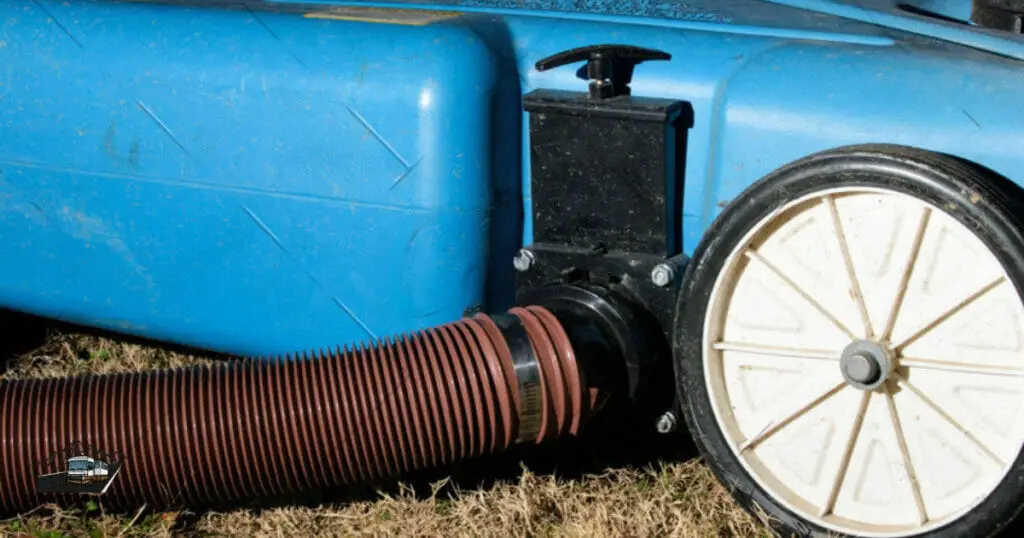RV sewage tote tanks are portable containers explicitly designed for storing and transporting wastewater from recreational vehicles (RVs). These tanks offer RV owners a convenient way to manage their black water disposal needs on the road. With the growing popularity of RV travel, having a dependable and efficient wastewater management system is critical for a pleasant and sanitary experience.
When RVs are parked in campgrounds or RV parks without direct sewer connections, sewage tote tanks become essential. RV owners can use these tanks to collect and transport wastewater from their RV’s holding tanks to designated dump stations for proper disposal. You can reduce the risk of environmental pollution by using an RV sewage tote tank to ensure that your wastewater is handled safely and responsibly.
I. The Benefits of Using RV Sewage Tote Tanks
1. Convenience:
RV sewage tote tanks make it easy to transport wastewater without having to make frequent trips to the dump station. You can easily collect and transport your wastewater in one trip with a portable tote tank, saving time and effort.
2. Flexibility:
With an RV sewage tote tank, you are not limited to campsites with full hookups. There are more campgrounds and RV parks to choose from, including those with limited or no sewer connections. This adaptability allows you to visit more places and have a wider range of camping experiences.
3. Odor Control:
RV sewage tote tanks are built with features that reduce odors and keep your RV fresh. Many models include tight seals, secure lids, and integrated rinsing systems to help control odors and maintain a pleasant camping environment.
4. Environmental Responsibility:
Proper wastewater management is critical for minimizing environmental impact. RV sewage tote tanks allow you to responsibly dispose of wastewater at designated dump stations, ensuring that it is handled and treated properly. This promotes environmental sustainability and aids in the preservation of camping destinations’ natural beauty.
II. Choosing the Right RV Sewage Tote Tank
There are a few key factors to consider when purchasing an RV sewage tote tank:
1. Capacity:
Based on your specific needs, determine the appropriate size and capacity of the tote tank. Consider the number of occupants in your RV as well as the length of your trips. A larger tank will require fewer trips to the dump station, but it will be heavier and bulkier to transport.
2. Durability:
Look for a tote tank made of tough materials like heavy-duty plastic or polyethylene. These materials are resistant to cracks, leaks, and UV rays, ensuring the tank’s longevity even in harsh outdoor conditions.
3. Mobility:
When selecting an RV sewage tote tank, keep transportation convenience in mind. Look for tanks with sturdy wheels and ergonomic handles to make it easier to maneuver the tank over different terrains and into the dump station.
4. Additional Features:
Some RV sewage tote tanks include these extra features; determine which ones match your specific needs and preferences.
5. Reviews and Ratings:
Before making a final decision, read reviews and ratings of various RV sewage tote tanks. This will give you information and feedback from other RV owners who have firsthand knowledge of the products. Consider factors like durability, ease of use, and overall customer satisfaction.
III. Maintaining and Cleaning Your RV Sewage Tote Tank
Proper maintenance and cleaning of your RV sewage tote tank is critical to its longevity and performance. To ensure effective maintenance, follow these steps:
1. Emptying and Rinsing:
Empty the waste water from your RV sewage tote tank at designated dump stations on a regular basis. To remove any residue and odors, thoroughly rinse the tank with fresh water. Pay special attention to the interior surfaces and make sure they are thoroughly cleaned.
2. Follow Manufacturer Instructions:
For specific cleaning and maintenance instructions, consult the manufacturer’s instructions. Because different models may have different requirements, it’s critical to follow the recommended procedures to avoid damaging the tank or its components.
3. Use RV-Safe Cleaning Agents:
When cleaning your RV sewage tote tank, use cleaning agents designed specifically for RV waste water systems. Harsh chemicals or household cleaners should be avoided as they can damage the tank and compromise its functionality. Choose eco-friendly options that are safe for both the tank and the environment.
4. Odor Control:
Use odor control measures to keep your RV sewage tote tank smelling fresh. Use RV-friendly chemicals or natural deodorizers designed for waste water systems. These items can assist in reducing odors and maintaining a pleasant camping environment.
IV. Essential Accessories for RV Waste Water Management
In addition to an RV sewage tote tank, there are several essential accessories that can enhance your waste water management system. Consider the following accessories:
1. RV Sewer Hose:
Purchase a high-quality sewer hose that is long enough to reach the dump station from your RV. To ensure dependable performance, look for hoses with reinforced construction and tight connections.
2. Hose Support:
A hose support system will keep your sewer hose from sagging or becoming damaged while in use. These supports elevate the hose above the ground, allowing for smooth waste water flow and lowering the risk of leaks or blockages.
3. Disposable Gloves:
Wear disposable gloves when handling the RV sewage tote tank or connecting/disconnecting the sewer hose to protect your hands from contamination. Gloves act as a barrier between you and the waste water, ensuring hygiene and reducing the risk of bacterial contamination.
4. Tank Treatment Chemicals:
Consider using tank treatment chemicals to break down waste, control odors, and keep your RV sewage tote tank in good working order. These chemicals aid in the prevention of clogs, the reduction of odors, and the efficient breakdown of waste matter.
Conclusion
RV sewage tote tanks play a vital role in waste water management for RV owners. They provide a convenient and efficient solution for collecting and transporting waste water, allowing for a more enjoyable and hygienic RV experience. By choosing the right RV sewage tote tank, properly maintaining it, and utilizing essential accessories, you can ensure a smooth waste water management process while minimizing the impact on the environment.
Investing in an RV sewage tote tank and implementing proper waste water management practices not only benefits you but also contributes to preserving the natural beauty of camping destinations for future generations. Enjoy your RV adventures with peace of mind, knowing that you have a reliable and effective waste water management system in place.



